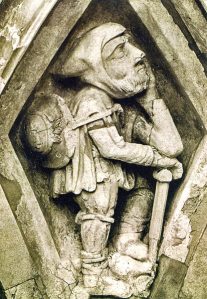Anne Catherine Emmerich, the great German mystic who died in 1824, once said that it was revealed to her in a vision that most medieval souls prepared for spiritual events with a devotion greater than what was present even in her own day. She explained that this fervor of deep religious spirituality which existed in the Middle Ages could not be comprehended by the people of her time, who had lost such a profound inclination.
If this is so, then how much more must we, almost 200 years later, be unable to comprehend the inner world of the devout medieval pilgrim preparing for his spiritual adventure. Yet I cannot help but feel that it may be worth considering what these preparations were like and what this can say for my own daily pilgrimage here in Italy and throughout the greater pilgrimage of life.
The externals of the pilgrims spiritual preparation are historically documented and easy to come by. Encouraged to prepare for the well-being of their soul, there was an assortment of rituals or personal actions that they could take. These included:
- attending a consecration ceremony where they would obtain the Church’s blessings on their souls and their journeys.
- confessing their sins to the priest and being “shriven.”
- being sprinkled with Holy Water.
- given a staff to carry on their journey. This became a symbol announcing to the world that they were a pilgrim and not a traveller with less honorable motives. There was even a blessing for this staff which would be imparted.
- fasting.
- speaking with an elder who had experienced pilgrimage first hand, gaining wisdom and insight for the road.
- making vows, such as not to speak unnecessarily or to abstain from sex, all in an effort to focus on their inner experience of the journey.
These are just some of the external actions that could be taken and can today be historically studied. What is more elusive is the effect that these exterior actions had on the souls of the pilgrims and what other private devotions they may have added. In a nutshell, what was the spiritual life of a pilgrim preparing for such a journey like?
This is where we enter into the undocumented realm of private devotions, prayers, meditations, and contemplations. If Anne Catherine Emmerich is right, and many medieval souls were far more devout in their preparations for great events, then we can only begin to imagine what intensity their prayer lives and personal devotions must have reached and the resulting richness they could have experienced.
It is likely that they prayed more and may have spent more time in meditation and contemplation. They may have asked for spiritual illumination and profound experiences that would change them in powerful ways. They may have asked for saints to intercede for them, guardian angels to look after them and they may have tried to approach each day as sacred while remaining open to signs and clues along their path.
Of course, this is just my speculation, but as a Catholic I am fortunate in that I possess one direct link back to this mindset, and that is my faith. What I believe today was believed 800 years ago, and thus while my external experience may never be the same my internal one has the potential to resonate strongly with that of the medieval pilgrim if only on the level of personal spirituality.
As I try to piece together what their secret preparations must have been like, I begin to see that it was a mental realm of intense faith unlike that of what we understand today.
For my own pilgrimage here in Italy and for the voyage of my life, I find in their example a need to cultivate this faith in the supernatural to levels that are the exact opposite of what our modern society expects from us. I see the importance of approaching each day as sacred and as a journey in itself.
Only then will the richness of a soul seeking the divine be able to flourish and only then will I understand what it truly is to be a pilgrim here in Italy and throughout my life.
Perhaps I will also be able to understand something of what is was like centuries ago as well.





 Sacred Heart of Jesus
Sacred Heart of Jesus
 St. Anthony of Padua
St. Anthony of Padua
 St. Catherine of Siena
St. Catherine of Siena